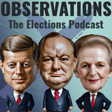
Famous By-Elections: Edward Timpson and Crewe & Nantwich 2008
Our team interviews for Conservative MP Edward Timpson, winner of the 2008 Crewe and Nantwich By-Election. The seat became vacant on the death of Gwyneth Dunwoody who had been the local MP since 1974. Timpson’s victory in the by-election was the first Conservative gain in a parliamentary by-election since 1982 and the first from the Labour Party since 1978. At the time, Gordon Brown had replaced Tony Blair as Prime Minister and it was the first by-election gain under future Prime Minister David Cameron’s leadership of the Conservative Party.
The Guardian said 'Gordon Brown is facing the gravest crisis of his premiership after David Cameron led the Tories to their first byelection gain in a quarter of a century this morning, on a 17.6% swing that would sweep the party into Downing Street. In one of the most humiliating setbacks to Labour since the era of Michael Foot.'
The BBC's Nick Robinson said 'Be in no doubt. If David Cameron becomes prime minister many will look back at the vote in Crewe and Nantwich as the moment they first believed it was possible.'
